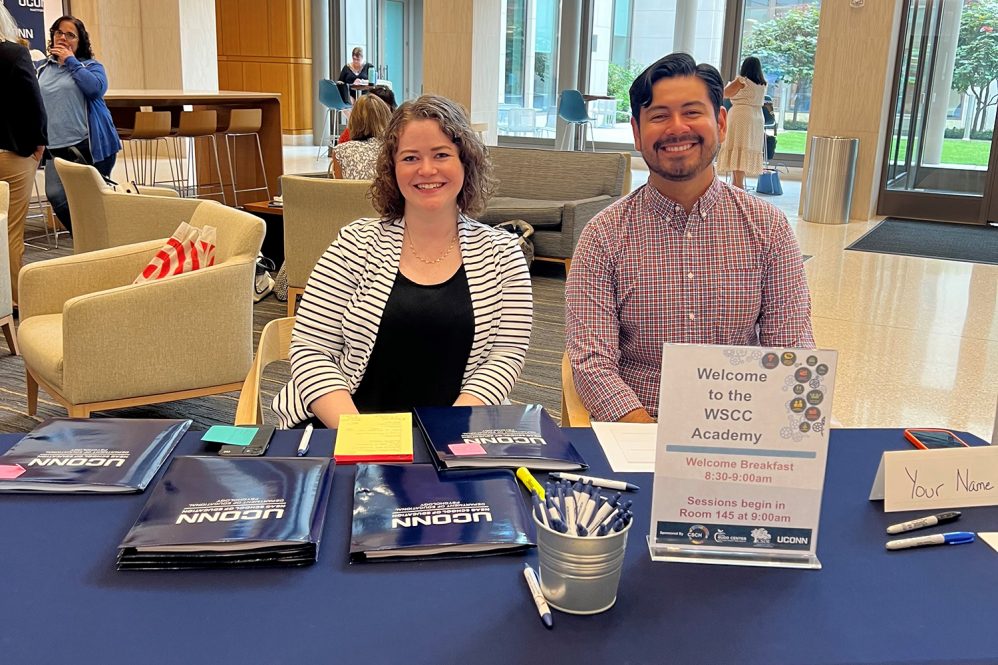Faculty and staff from the UConn Collaboratory on School and Child Health (CSCH) and the UConn Rudd Center for Food Policy and Health recently worked together to provide a free professional development day for school staff to learn how to strengthen school practices to promote whole child development. The “WSCC Academy” took place on Aug. 21 at UConn Hartford and was cosponsored by the Connecticut State Department of Education.
With participants from six school districts, the Academy was geared to help school wellness teams learn more about the Whole School, Whole Community, Whole Child (WSCC) model; how to evaluate WSCC-related practices in their own schools; and how to develop a strategy to strengthen those practices.
Attendees learned how to do this by using the WSCC Practice Blueprint, an action-planning tool developed in 2022 by CSCH to help schools assess and strengthen their WSCC-aligned practices. The blueprint is the latest in a series of tools that CSCH and the Rudd Center have worked together to develop over the last several years. The WellSAT WSCC, developed jointly by CSCH and the Rudd Center in 2019, is another tool designed to assist schools and researchers in taking a comprehensive and integrated lens to school policy evaluation.

“It was exciting to see school principals, directors of food and nutrition services, and chairs of health and physical education all coming together to work towards a common goal,” says Kate Williamson ’13 MA, ’17 Ph.D., Postdoctoral Research Associate at CSCH and WSCC Academy Coordinator. “They were able to identify opportunities for meaningful and sustainable changes to practices in their schools and districts to strengthen whole child development.”
School districts also learned about putting together effective teams to lead the WSCC work. “The take home message for me was to collaborate with your multidisciplinary school personnel, as everyone’s work is important in supporting the whole child,” says Pamela Neleber, Director of Health Services for the Branford Public Schools and a WSCC Academy participant.
Throughout the day, participants had the opportunity to learn from colleagues across the state, and to collaborate with others within their districts. “We saw connections being made, in which health directors and school mental health professionals were recognizing redundant efforts, and brainstorming about how they could better allocate their resources to promote student development,” says Williamson.
“In some ways, the WSCC Academy felt like the culmination of our ongoing collaboration with the Rudd Center,” says Sandra Chafouleas, Board of Trustees Distinguished Professor and Neag Endowed Professor in the Department of Educational Psychology in the Neag School of Education. “In other ways it felt like just the beginning.”
It was exciting to see school principals, directors of food and nutrition services, and chairs of health and physical education all coming together to work towards a common goal. — Kate Williamson, WSCC Academy coordinator
Chafouleas and Marlene Schwartz, Director of the Rudd Center and Professor in Human Development and Family Sciences were recently awarded a five-year CDC grant to protect and improve the health and well-being of school-age children and adolescents, along with Co-investigators Williamson and Jessica Koslouski, Assistant Research Professor in Educational Psychology and CSCH staff member. The goal of the grant project is to help Connecticut school districts develop and implement coordinated and evidence-based school policies and practices to support all aspects of student health and well-being.
“Because of the CDC funds, this was actually the first of many such professional development days we have planned for Connecticut school wellness teams,” says Koslouski. “We will be providing professional development and technical assistance to support districts across the state of CT with their implementation of the WSCC model over the next five years.”

Districts are enthusiastic about the effort so far. “The WSCC Academy provided many tools that will lead my district’s wellness committee’s goals in support of the Whole School, Whole Community, Whole Child Model,” says Neleber.
“We had an opportunity to collaborate on multiple activities to create our roadmap for wellness over the next few years, identify key members of our district wellness committee, and examine our current practices,” says Jennifer DeRagon ’12 6th Year, principal of George Hersey Robertson School in Coventry. “It was incredibly helpful to hear from other districts for networking.”
“The Rudd Center has been working to support wellness in Connecticut schools in a variety of ways for nearly two decades,” says Schwartz, who has led the Rudd Center’s school nutrition and policy evaluation initiatives since 2004. “We are very excited to be able to provide this type of professional development to districts across the state and support student health and academic achievement.”
Both the Collaboratory and the Rudd Center are part of the Institute for Collaboration on Health, Intervention, and Policy (InCHIP) at UConn.
To be kept up to date about future professional development opportunities, school personnel can contact CSCH via email.



